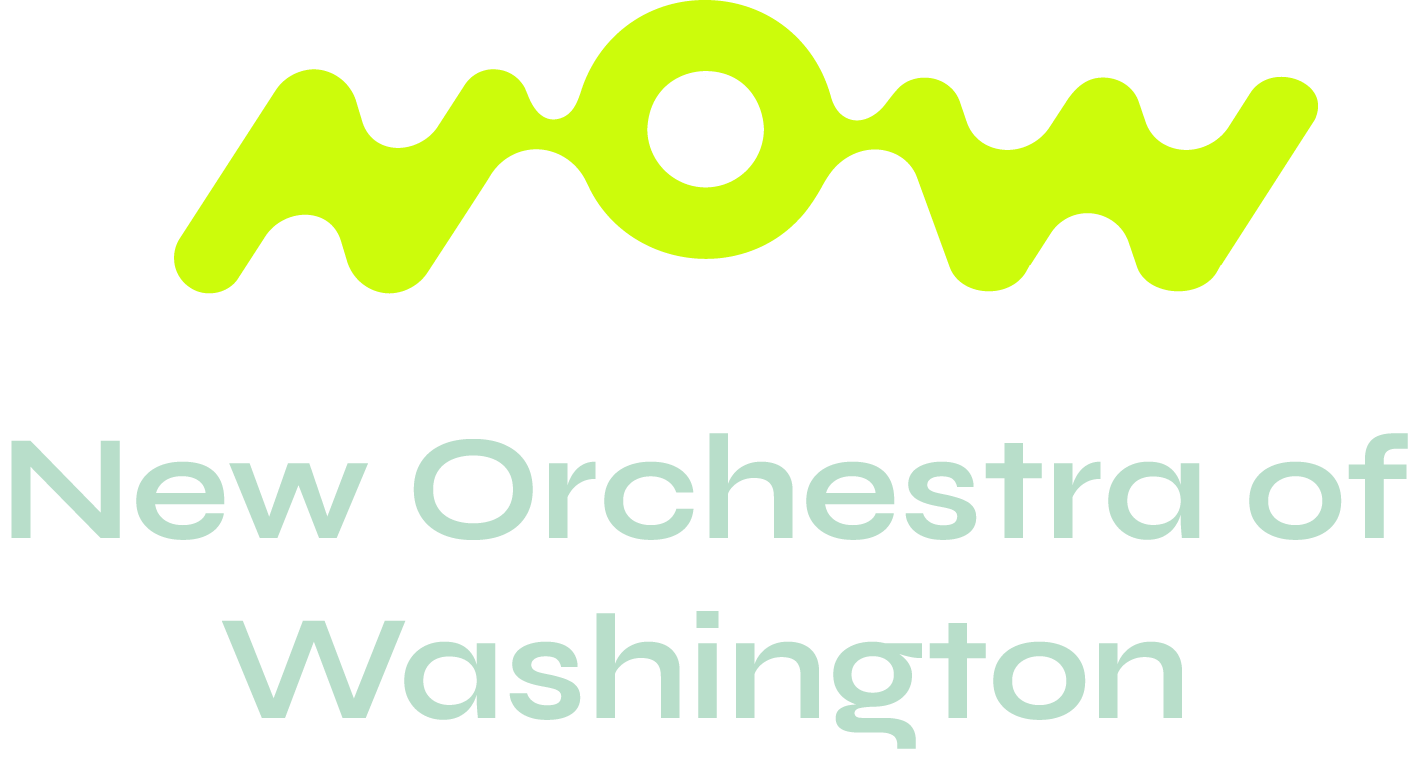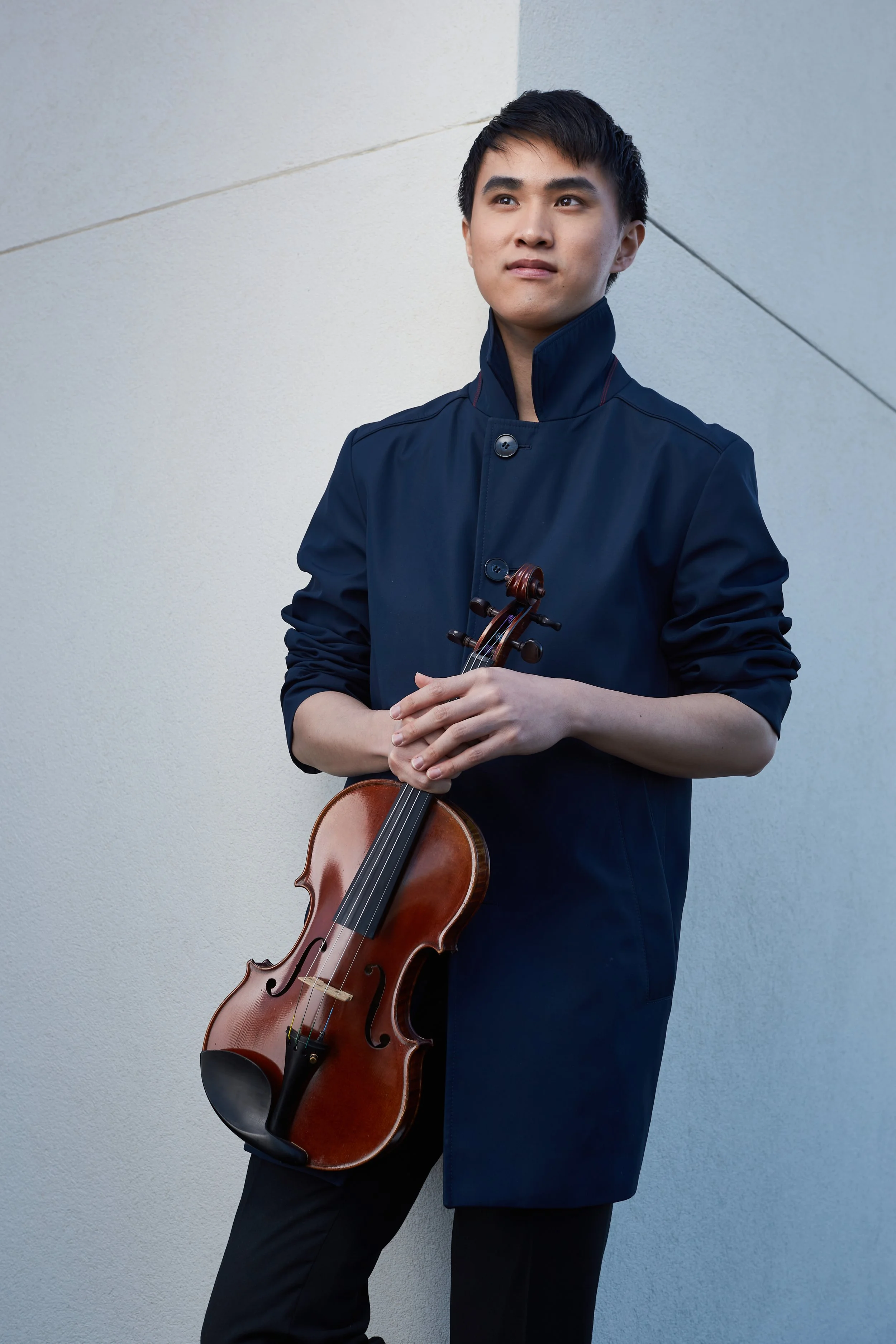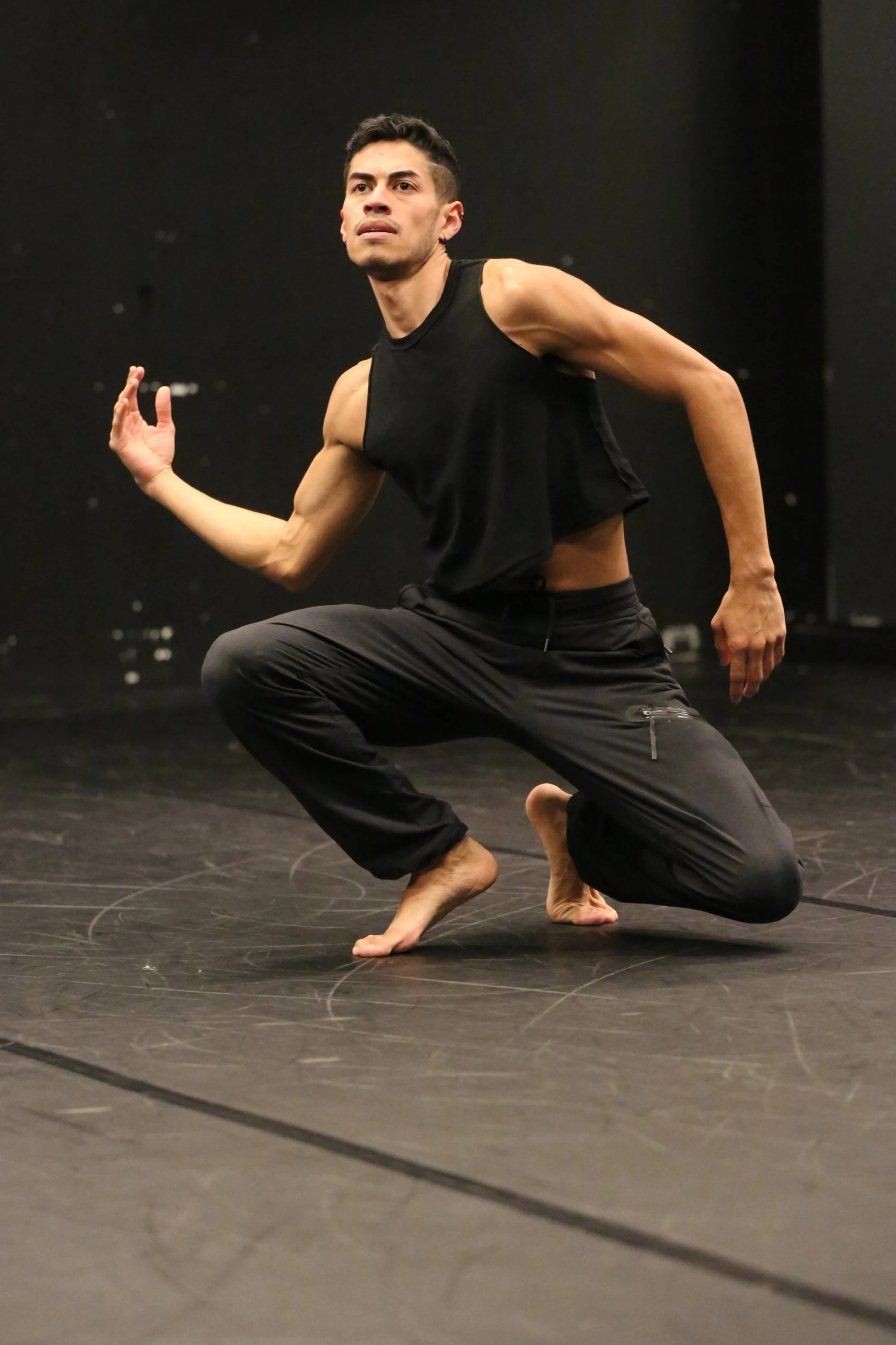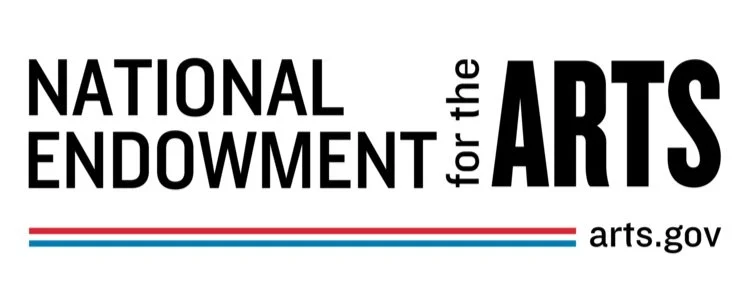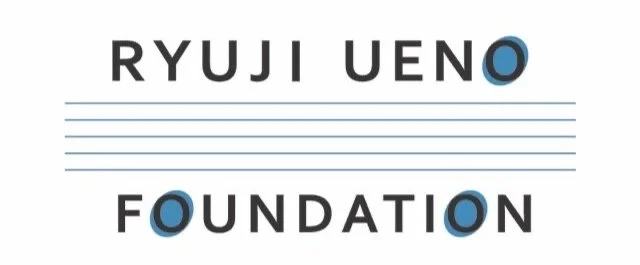New Orchestra of Washington presents
Love is Love is Love is…
Alejandro Hernandez-Valdez, conductor
Kevin Zhu, violinist
Gabriel Mata & Amelia Rose Estrada, dancers
Sunday, April 21 | 5:00 PM
The John F. Kennedy Center for the Performing Arts
Terrace Theater
2700 F St., NW, Washington, DC 20566
Experience a night of breathtaking music that celebrates the many faces of love with Love is Love is Love is.… We’ll take you on a journey exploring the different facets of human love. From the forbidden to the universal, this program showcases the many ways that love touches our lives and inspires us all.
NOW gratefully acknowledges the Ryuji Ueno Foundation for sponsoring this concert.
Program
REENA ESMAIL (b. 1983) “Testament” (from Vishwas)
-
Reena Esmail (pronounced REE-nah ES-mayl) is American born, though her parents emigrated from India. Esmail studied at Juilliard and the Yale School of Music, training that grounded her in the musical visions of great past masters. However, she is also appreciative of her cultural musical roots, which find expression in her compositions. Esmail’s music is often flavored by raags (sometimes called ragas): combinations of musical tones upon which a composition is based, affecting the mood that is likely to result from those tones. So far, that sounds like what in Western music is called a “key.” However, with its countless cultures, India has significantly more raags than there are keys: six dozen or more, depending on who’s doing the counting.
Esmail’s Vishwas (2014) is a three-movement work commissioned and premiered by the Albany Symphony. Intended for Indian classical dancer and orchestra, it concerns Meera Bai, a 15th century saint-poet of India, and her devotion to Lord Krishna, whom Esmail describes as an “intangible but omnipresent figure.” In the closing movement “Testament,” initial passages for shimming strings leads to building fervor with racing lines and the otherworldly harmonies of Hindustani raags. That’s “otherworldly” quite literally, as it is music grounded in a far different culture than the generally European foundation of most classical music.
In the work’s original version, Esmail included woodwinds, brass, and piano in the orchestra. However, she also created one for string orchestra, and that’s what the New Orchestra of Washington will perform. Both versions include the hand drums known as tabla. This provides not only a propulsive beat, but also a distinctly Hindustani mood. There can be little doubt that here is music inspired by the Indian subcontinent.
—Notes by Betsy Schwarm, author of the Classical Music Insights series. Used with permission.
LEONARD BERNSTEIN (1918–1990) Serenade (after Plato’s Symposium)
Phaedrus: Pausanias (Lento; Allegro marcato)
Aristophanes (Allegretto)
Eryximachus (Presto)
Agathon (Adagio)
Socrates, Alcibiades (Molto tenuto; Allegro molto vivace)
Featuring Kevin Zhu
-
In all but name a violin concerto, Leonard Bernstein’s Serenade after Plato’s Symposium (1954) was written for virtuoso violinist Isaac Stern, under a commission from the Koussevitzky Music Foundation. As the title should make clear, it is a truly Platonic composition, that is, one inspired by the ancient Greek writer Plato (431–351 BC). In his Symposium, as in many of his writings, he recalls stories of the late Socrates, who died in 399 BC. In fact, none of Socrates’ own writings have survived; history knows of him nothing other than what Plato says.
In the Symposium, friends are gathering at the house of Agathon for dinner, several still feeling the effects of earlier celebrations. They agree that they shall talk instead of drink, and vow to have a conversation instead of a drinking party. That vow will only endure for a portion of the evening, before drinking resumes.
Bernstein gave each movement a subtitle derived from the names of various speakers in Plato’s Symposium.
I. Phaedrus; Pausanias
Phaedrus opens the symposium with a song of praise to Eros, the god of love. Pausanias continues by considering the difference between physical love and spiritual love. The latter he considers to be the more admirable.
II. Aristophanes
Aristophanes invokes the mythology of love. As Plato observes, love is “the helper and the healer of the ills which are the great impediment to the happiness of the race.”
III. Eryximachus
In this short, lively movement, the physician speaks of bodily harmony as a scientific model for the workings of love-patterns.
IV. Agathon
Agathon extolls all aspects of love’s powers, charms, and functions.
And in the boisterous last movement:
V. Socrates; Alcibiades
Socrates launches into a sermon on the true nature of love, only to be interrupted by Alcibiades and his band of drunken revelers. For this final joyful scene, Bernstein evokes more than a measure of jazz, remarking in his own notes for the work, “I hope it will not be taken as anachronistic Greek party music, but rather the natural expression of a contemporary American composer imbued with the spirit of that timeless dinner party.”
Listeners are advised to think of the revelers and of love: that’s what Bernstein hoped to evoke!
—Notes by Betsy Schwarm, author of the Classical Music Insights series. Used with permission.
Intermission (15 minutes)
RODION SHCHEDRIN (b. 1932) Carmen Suite (after Bizet’s opera)
Introduction
Dance
First Intermezzo
Changing of the Guard
Carmen's Entrance and Habanera
Scene
Second Intermezzo
Bolero
Torero
Torero and Carmen
Adagio
Fortune-Telling
Finale
Featuring Gabriel Mata and Amelia Rose Estrada
-
Russian composer/pianist Rodion Shchedrin (b. 1932) is better known in Europe than in the US. Perhaps his lesser fame here is due to the challenge of mastering his name, which, for the record, is pronounced “sh-ched-REEN”, with the opening consonants suggesting the combination in the middle of the phrase “fresh cheese”. Though his name can be difficult, Shchedrin’s music is rarely shockingly modern. It is tonal, often melodic, and frequently characterized by rhythmic energy.
When it comes to rhythmic energy and familiar melodies, one could hardly imagine a better inspiration than the opera Carmen (1875) by Georges Bizet (1838–1875), with its distinctly Spanish setting and the title character’s personal view of love. In his one-act ballet version of the tale, Shchedrin condenses the action and reworks the musical themes according to his own imagination, sometimes drawing in part on the audience’s familiarity with the original work.
For example, for the scene in which Shchedrin has turned his attention to Escamillo, the toreador, it begins much as one might expect. However, gradually the tune itself becomes subsumed in atmospheric string textures. The composer has chosen to rely upon his listeners to continue hearing that tune in their own imaginations as he adds an additional perspective to the scene.
Shchedrin’s Carmen ballet premiered at Moscow’s Bolshoi Ballet in 1967 with choreography by Alberto Alonso. The title role was danced by Maya Plisetskaya, then prima ballerina at the Bolshoi, though also Shchedrin’s wife. It is scored for string orchestra with a plethora of percussion, six players required to manage them all. Shchedrin offers his 20th century vision of that beloved opera, but one that never entirely loses track of what Bizet had achieved.
—Notes by Betsy Schwarm, author of the Classical Music Insights series. Used with permission.
Meet the Artists
-
Esteemed conductor and pianist Dr. Alejandro Hernandez-Valdez is Artistic Director of Musica Viva NY and Director of Music at the historic Unitarian Church of All Souls in Manhattan. He is also Artistic Director and co-founder of the New Orchestra of Washington, and Artistic Director of the Victoria Bach Festival. He has earned accolades from The Washington Post as a conductor “with the incisive clarity of someone born to the idiom,” as well as praise from The New York Times for leading “a stirring performance” of Brahms’ Ein Deutsches Requiem. At a concert commemorating the 100th Anniversary of the WWI Armistice (featuring the world premiere of Joseph Turrin’s cantata, And Crimson Roses Once Again Be Fair) Oberon’s Grove wrote: “Maestro Alejandro Hernandez-Valdez drew rich, warm sounds from the musicians” in “a beautiful and deeply moving program.” He is featured in El mundo en las manos/Creadores mexicanos en el extranjero (The World in Their Hands/Creative Mexicans Abroad), a book by the Mexican Ministry of Foreign Affairs honoring Mexican nationals who are leading figures in diverse artistic fields. He is the recipient of a 2016 Shenandoah Conservatory Alumni of Excellence Award for his exemplary contribution to his profession, national level of prominence, and exceptional integrity. He resides in New York City.
In 2016, during its 40th anniversary season, Hernandez-Valdez was named the third Artistic Director of the Victoria Bach Festival in Texas. As Mike Greenberg wrote in Classical Voice America: “A big question mark hung over the venerable Victoria Bach Festival two years ago when the brilliant Craig Hella Johnson, its artistic director since 1992, decided to give up the post…Johnson’s successor has replaced the question mark with an exclamation point — perhaps more appropriately, given his Spanish name and Mexican provenance, two exclamation points: ¡Alejandro Hernandez-Valdez!” “The results,” Greenberg continued, “were astonishing.”
Founded in 1977, Musica Viva NY was recently praised by The New York Times as “an excellent chorus.” The ensemble has a longstanding tradition of top-caliber performances, innovative programming, and a strong dedication to the commissioning of new music. Its alumni include Renée Fleming, Samuel Ramey, and Michael Maliakel. Since taking the helm at Musica Viva NY in 2015, Hernandez-Valdez has presented an exceptionally broad and innovative repertoire in each of the choir’s seasons, engaging and inspiring audiences with remarkable interpretations of familiar and new works, and exploring the acoustical capabilities of the historic sanctuary of All Souls Church and other venues on Manhattan’s Upper East Side.
As the Artistic Director and co-founder of the New Orchestra of Washington (NOW), a chamber orchestra that “has constituted itself in the forefront of this smaller-is-better movement” (The Washington Post), Hernandez-Valdez has been reimagining for the past ten years what have been the limited definitions of “classical music.” NOW’s innovative programming and creative approach to music performance continues to reshape and enrich the cultural landscape of the National Capital Region.
A passionate advocate of new music, Hernandez-Valdez has commissioned and premiered works by Joan Tower, Arturo Márquez, Joseph Turrin, Gilda Lyons, Seymour Bernstein, Viet Cuong, Juan Pablo Contreras, Elena Ruehr, Ramzi Aburedwan, Jorge Vidales, Mokale Koapeng, Trent Johnson, Javier Farias, Andrés Levell, Zachary Wadsworth, Martin Spruijt, Joel Friedman, and other notable composers.
Hernandez-Valdez’s guest conducting engagements include appearances at The Kennedy Center in Washington, D.C., Lincoln Center in New York City, and the historic Degollado Theatre in Guadalajara, Mexico, where he has directed the Jalisco Philharmonic. As a pianist, Hernandez-Valdez performed for the 2013 Britten100 festival in New York City, organized by the Britten-Pears Foundation to honor the 100th anniversary of the titular composer’s birth. As a composer and conductor, he led the premiere of his own composition, The Imaginary City, a cantata inspired by the life of Ramzi Aburedwan, a violist who has opened schools throughout Palestine to teach music to children in refugee camps. He also arranged and premiered the chamber orchestra version of A Song of Nature by Seymour Bernstein. Mr. Bernstein, the subject of Ethan Hawke’s 2014 documentary film, Seymour: An Introduction, is one of Hernandez-Valdez’s most influential teachers and mentors.
-
American violinist Kevin Zhu has amassed an outstanding record of concert performances and competition wins since he began playing violin at age three. Praised for his “awesome technical command and maturity” (The Strad) and “absolute virtuosity, almost blinding in its incredible purity” (L’ape musicale), Kevin has performed on the world’s largest stages, ranging from the Konzerthaus Berlin to London’s Royal Festival Hall to the Forbidden City Concert Hall in Beijing. Initially coming to international attention after winning the 2018 Paganini Competition and 2012 Yehudi Menuhin Competition, he has established himself as a leading figure among the next generation of musicians, astonishing audiences with his peerless technical mastery and inimitable artistic voice.
In the 2023–24 season, Kevin makes his Kennedy Center debut performing Bernstein’s Serenade (after Plato’s Symposium) with the New Orchestra of Washington, returns to the Auditorio Nacional in Madrid and Victoria Hall in Singapore, and tours with cellist Jan Vogler and pianist Andrew Armstrong. Kevin embarks on a multi-city recital tour across China and makes his debut at the Esplanade Concert Hall with Shostakovich’s 1st Violin Concerto.
Recent performing highlights include concerts on Paganini’s famed violin ‘Il Cannone’, concerto appearances in Beijing and at the historic Reggia di Caserta in Italy, and recitals in Santiago de Chile and Montréal’s Salle Bourgie. Kevin is also a passionate chamber musician, collaborating frequently with artists such as Louis Lortie, Lawrence Power, and Boris Giltburg.
In addition to his endeavors on stage, Kevin serves as a Culture Ambassador of the Lin Yao Ji Music Foundation of China. He has been featured on ABC Eyewitness News, BBC Radio 3, and RAI Radio 3, and is the recipient of a 2021 Avery Fisher Career Grant and Salon de Virtuosi Career Grant.
Kevin holds a Bachelor’s degree from The Juilliard School, where he studied with Itzhak Perlman and Li Lin. Kevin performs on the c.1700 “ex-Petri” Antonio Stradivari violin, which is on loan from the Ryuji Ueno Foundation and Rare Violins In Consortium, Artists and Benefactors Collaborative.
Learn more at kevinzhuviolin.com
-
Gabriel Mata (pronounced: gah-bryehl mah-tah) M.F.A is a Mexican U.S. American dance choreographer, educator, dance film maker, and performer. He also navigates the world as queer, Latinx, immigrant, and as of recently a permanent resident to the U.S. He creates with a humanistic and egalitarian process while developing practices of decentering / decolonizing. The StarTribune has called him “Sly, subtle and totally virtuosic, theatrical dancer-choreographer Gabriel Mata holds the stage with expressive movement and witty words.”
Gabriel Mata/Movement is a Washington DC project-based company, initiated in 2015. His dance works have been performed in Minnesota, California, New York, North Carolina, Maryland, Pennsylvania, Washington DC, and the John F. Kennedy Center for the Performing Arts. In collaboration with haus of bambi, he has created dance films. His dances have been commissioned and presented by Georgian Court University, sjDANCEco, the Festival of Latin American Contemporary Choreographers, Dance Place, Silicon Valley Pride, and the Hispanic National Bar Association. Recently, he was awarded the DC Commission for the Arts and Humanities Fellowship Grant. He received his Masters in Fine Arts from the University of Maryland - College Park. He can be found at gabrielmatamovement.com
-
Amelia Rose Estrada is a queer, Latina-Jewish performance maker and scholar. She is interested in crafting work that speaks to Latinidad, gender, queerness, and intergenerational ancestral relationality. Her work draws on methods from dance, performance art, and theater. Her choreography has been presented at University Settlement in NYC, SPACE in Portland, Maine, the Spark Theater Festival NYC, and at Cuerpo Mediado Festival de Videodanza in Rosario, Argentina, among others.
As a theater creative, Amelia co-choreographed CarmXn, a modern adaptation of the opera Carmen with Hogfish Maine, was the associate choreographer for Moonbox’s production of Sweeney Todd, and co-directed and choreographed the musical adaptation of Twelfth Night at Tufts University. In addition to her individual projects, Amelia makes lesbian dance theater with her artistic partner, Elle Jansen, under the company name MELLE. As a freelance performing artist, she has had the pleasure of working with Edwin and Matt Cahill, Joy Clark, Eventual Dance Company, Brian Sanders' JUNK, and Leilani Chirino Dance and Drum Ensemble, among others.
Amelia is a PhD candidate in the Theater, Dance, and Performance Studies and her current research focuses on how dance participates in the cultural and national imaginary of Dominicanidad in the Dominican Republic and diaspora.
Find her online at aremoves.com
-
Violin I
Akemi Takayama, concertmaster
Alex Fortes
Matt Richardson
Nancy Jin
Micca Page
Gabrielle GansViolin II
Sergey Prokofyev
Lauren Scott
Chae Yeom
Debo Katz
Shu-Ting YaoViola
Greg Luce, principal
Ivan Mendoza
Dan ZhangCello
Valeriya Sholokhova, principal
Tobias Werner
Joseph GotoffDouble Bass
Chris Chlumsky, principal
Teddy HerseyHarp
Eric SabatinoPercussion and Timpani
Lee Hinkle, principal
Isabella Scotti
Eunice Sun
Jack Kerness
Mako Robeson
Michael Valente
New Orchestra of Washington
-
Reimagining what have been the limited definitions of “classical music,” the New Orchestra of Washington (NOW) welcomes audiences into a transformative musical experience that lessens the distance between our identities and compels listeners to feel something in the sound.
We create what we call “great music without labels.” It represents the robust cultural and ethnic diversity in metropolitan Washington, DC, where we’re intentional about making orchestral music beautiful and accessible to people from all backgrounds. Our hallmark is small, intimate performances that put audiences at the heart center of musicians who pour the best of themselves and their cultures into immersive concerts that leave attendees inspired.
NOW is guided by six values—collaboration, representation, education, access, technology and experimentation (CREATE)—to foster innovative, inclusive programming; nurture enriching partnerships; and infuse the global flavors of all music. We lead with love for the experiential music we create and, most important, the people we want to absorb it.
Our Mission: to make transformative musical experiences available and accessible to all people.
-
Officers
Dianne Peterson, Chair
Ann Yonemura, Secretary
Paul Connor, TreasurerBoard Members
Morris Deutsch
Rachel Dougan
Louise Harkavy
Neeta Helms
Joan Lewis
Tom Patton
Ryuji Ueno
Sinclair Vincent
Sarah Wilson
Grace Cho, ex-officio
Alejandro Hernandez-Valdez, ex-officio -
Alejandro Hernandez-Valdez, Artistic Director
Grace Cho, Executive Director
Abby Carlson, Manager of Operations
Richard Spero, Education and Community Coordinator
Chae Yeom, Manager of Artistic Programs
Marc Lee, Digital Media and Marketing
Friends of NOW
The Friends of NOW is a vital group of supporters who empower and enable NOW to build a world where transformative musical experiences are accessible and available to All People.
-
Anonymous
Tariq Abanumay
Karen Baynard
Betsy & David Bennett
Devar Burbage
Rose E. Lee and Steven Butler
Katie & Steve Capanna
Diana & Scott Carlson
Gerri Carr
Katrina Chan
Yuri Chayama
Heather Hippsley & Paul Connor
Tad Czyzewski
Nancy and Morris Deutsch
Rachel & Jim Dougan
John Driscoll
Elizabeth Dunham
Herta & Jim Feely
Kathleen Plunkett and Robert Fruitt
Jess Gersky
Polly B. Gordon
Douglas Grove
Louise & John Harkavy
Margot Hennings
Bonnie Hetzel
Reiko Hirai
Joan Lewis and Robbie Hopkins
Andy & Tim Ireland
Steve Kaffen
Ann and Knight Kiplinger
Rusty and Suzanne Krauss
Sachiko Kuno Foundation
Sarah Wilson & Louis Lappin
Lucia Leith
Terri Lesko
Kathleen Madigan
Rosalie Mandelbaum
Ruth and Joseph McInerney
Janet and Ed Moyer
Thomas Natelli
Elizabeth and Tom Patton
Dianne & Frank Peterson
Laura Pruitt
Clara Rodriguez
S&R Evermay
Liz Savage
Nanette & David Schoeder, in memory of Charles Williams
Rita Sloan
Mary Jo and Douglas Smith
Monique Smith
Irene & Dick Spero
Daphne Kiplinger and Dave Steadman
Jeanie & Richard Teare
Dr. Ryuji Ueno
Terry Ulmer
Sinclair Vincent
Ann and Woody Woodward
Ann Yonemura
Our Sponsors
The performance of Love is Love is Love is… is made possible in partnership with the Briggs Center for Faith & Action. The Briggs Center is a non-profit organization that welcomes, supports, provides services for, and advocates on behalf of immigrants and refugees through an immigration legal clinic, free ESOL classes, and a hospitality/housing program. Go to www.BriggsCenter.org to learn more or to support the work of the center.
NOW gratefully acknowledges the support of our 2023–2024 season sponsors:
Ann & Knight Kiplinger
This performance is an external rental presented in coordination with the Kennedy Center Campus Rentals Office and is not produced by the Kennedy Center.
